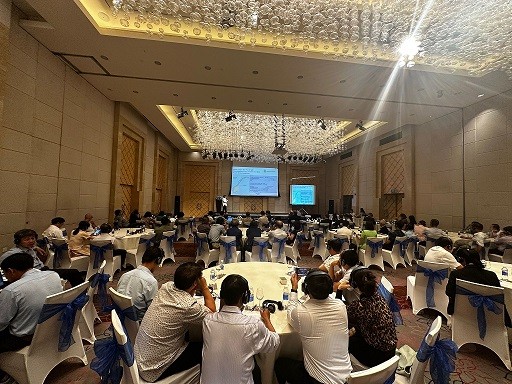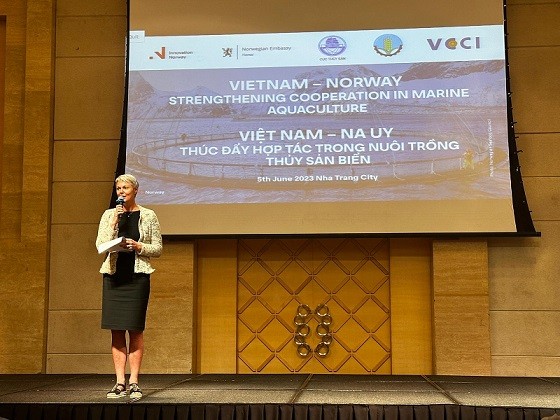
Vietnam - Norway: Sharing experiences to address challenges and grow a sustainable marine aquaculture
Latest
 |
| Overview of the Seminar “Norway-Vietnam: Strengthening cooperation in marine aquaculture” in the Sheraton Nha Trang Hotel, Khanh Hoa Province. (Photo: PH) |
The Commercial Section of the Norwegian Embassy in Hanoi – Innovation Norway, Hanoi, in coordination with the Directorate of Fisheries (DFish) of the Vietnamese Ministry of Agriculture and Rural Development Vietnam (MARD), Vietnam Chamber of Commerce and Industry (VCCI), and Khanh Hoa Department of Agriculture and Rural Development organized Seminar “Norway-Vietnam: strengthening cooperation in marine aquaculture” in the Sheraton Nha Trang Hotel, Khanh Hoa Province.
The Seminar spotlights the presence of Norwegian Ambassador to Vietnam H.E. Hilde Solbakken, Deputy Director General of Khanh Hoa Department of Agriculture and Rural Development (Khanh Hoa DARD), Mr. Le Van Hoan; DFish Director General Mr. Tran Dinh Luan, and Commercial Counsellor of the Norwegian Embassy, Director of Innovation Norway in Hanoi, Mr. Arne Kjetil Lian. The event brought together around 100 participants from central authorities suach as DFish, Department of Science, Technology and Environment; DARDs and Departments of Fisheries of coastal provinces of Khanh Hoa, Phu Yen, Ba Ria Vung Tau, Nghe An, Quang Tri, Kien Giang; academia and universities under MARD; Vietnam Sea Culture Associations; international organizations, NGOs; a large number of Norwegian and Vietnamese companies representing different segments of the marine aquaculture industry; and other stakeholders.
The Seminar aimed to create a platform for the participants from the public, private sectors, and academia to discuss ways for Vietnam to develop marine aquaculture in a sustainable manner and the role of relevant stakeholders in that process. The importance of innovation and technological solutions in the industry’s growth and how to train skilled workers to meet the industry’s requirements were also parts of the seminar’s agenda.
Two special guest speakers from the Norwegian Directorate of Fisheries, Ms Anne B. Osland and Mr. Erlend Hopsdal Skjetne, shared a lot of great insights into how the Norwegian Government developed policies, standards, and technical regulations for marine fish farms, how the licensing procedures go in line with the coastal planning taking into account the need to protect the marine environment and biodiversity.
“This event gives new impetus to Norway-Vietnam bilateral cooperation in the fisheries sector and implements the Letter of Intent between MARD and the Norwegian Ministry of Trade, Industry and Fisheries signed in 2021 for Enhanced Bilateral Cooperation in Marine Aquaculture Industry,” said Ambassador Solbakken in her opening remarks.
 |
| Norwegian Ambassador to Vietnam Hilde Solbakken shared the key success factor behind Norway's story. (Photo: PH) |
“As an ocean nation, coastal industries including fisheries and aquaculture are crucial for Norway’s economic growth and employment in communities all along the Norwegian coastline. Norway cares about how to develop them in a sustainable manner so that our children and grandchildren can also benefit from the ocean as we do today. Good management of our ocean areas is also essential to ensure that different ocean industries can coexist in harmony with each other and the environment. A key success factor behind our story as a world-leading producer and exporter of seafood has been our ability to maintain an open and trust-based dialogue between government, industry, and research institutions. This can be well illustrated through the stories we shared at the Seminar today, which we hope practical examples of how we have done this in Norway,” Ambassador Solbakken continued.
“Despite its huge potential for marine aquaculture development, Vietnam still faces challenges in developing the marine aquaculture industry, including inconsistent infrastructure facilities, elementary equipment and instruments, shortage of skilled workers etc. As coastal nations, Vietnam and Norway share many similarities and interest. Therefore, studying Norwegian experiences and success stories would provide us with suggestions to address the current challenges, build appropriate policies to grow a strong and sustainable marine aquaculture industry,” said Mr. Tran Dinh Luan, MARD DFish Director General.
“In the context of a shift toward sustainable aquaculture practices, for Norway’s aquaculture industry to continue to grow, the industry must focus on sustainable processes. It starts from good planning and good policies, which, in turn, could help create an enabling environment for the industry to grow. Norway has a lot to share in terms of how we develop an enabling regulatory framework with strict regulations and standards for licensing aquaculture at sea or offshore aquaculture, how to run a site at sea to ensure both the site’s production capacity and minimize its impact on the marine eco-system, and so on”, said Ms Anne B. Osland, Head of Aquaculture Licensing Section, Aquaculture and Coastal Management Department, Norwegian DFish.
Today, Norwegian aquaculture is among the largest export industries in the country, only trailing oil and gas. It has become a highly productive and professionalized industry, directly employing more than 8,000 people in coastal communities. Innovation and the development of new technology are key to future success. Research and development of new and more sustainable production processes can happen throughout the value chain and where the private sector has a key role to play. The close collaboration between government, industry, and research has been an important factor that explains the success of Norwegian aquaculture. A strengthened focus on technology and sustainability is now apparent across the entire aquaculture sector in Norway.
Meanwhile, Vietnam has been implementing a Scheme on Marine Aquaculture Development till 2030 with a vision to 2045, approved on 4 October 2021 by the Prime Minister of Vietnam, which aims to develop a consistent, safe, effective, sustainable and eco-friendly marine aquaculture, produce branded products to meet domestic and foreign demand, generate jobs and improve income of the local coastal communities. Reducing exploitation and increasing aquaculture has also been defined by MARD as a policy to balance between human needs and marine resources conservation and sustainable development. Thus, a shift to offshore farming on industrial scale, targeting at exports and improved quality and values of Vietnamese seafood products is inevitable.
An interesting fact shared at the Seminar is that some Norwegian fish farms are open for public visits for informational and educational purposes, which showcases that coastal industries are not always conflicting but can be complementary and grow together.
Participants in the Seminar are offered an opportunity to join a field trip to visit the fish farm of Australis Vietnam Co. Ltd off Van Phong Bay, Khanh Hoa Province to learn about industrial cage farming practices and automated facilities/systems that help reduce the carbon footprint from aquaculture business.





















